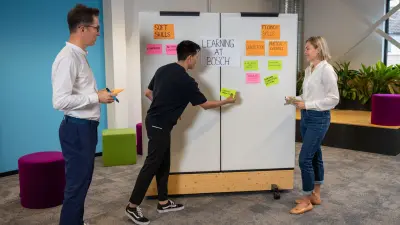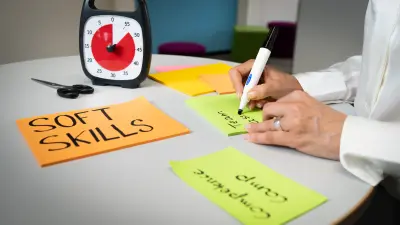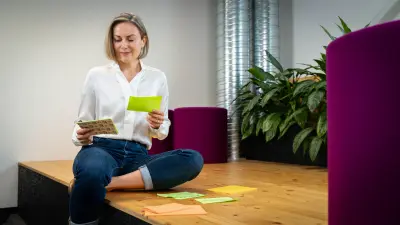Learning at Bosch
How we keep evolving
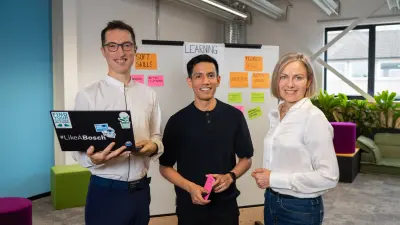
Learning at Bosch: This means having the opportunity to develop professionally and personally. Antonio, Karolina and Hamza share their experience of their learning journeys.
Whether it’s digitalisation and connectivity, evolving mobility, demographic shifts, or the rise of automation and artificial intelligence — the conditions for the labour market are constantly changing. That’s why development is so important to us at Bosch. We know that by fostering a culture of continuous learning, our associates will get the chance to develop, and contribute new strengths back to the company in the long term.
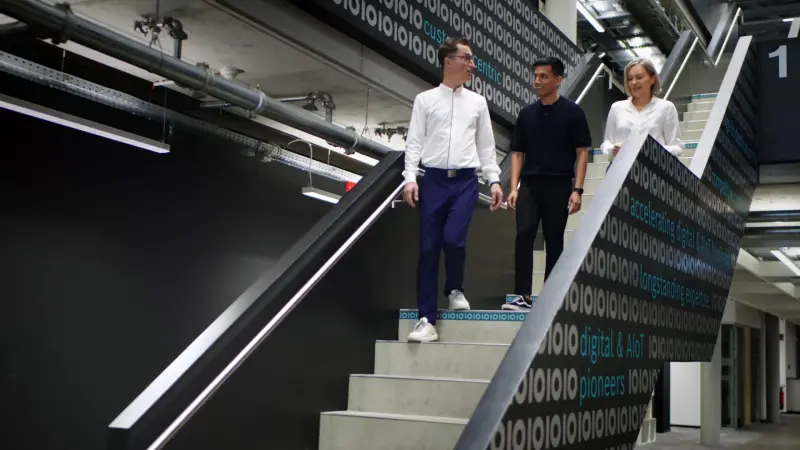
One company, many ways of learning
Bosch supports personal and professional development in numerous ways. With around 29,000 seminars and webinars, we offer a diverse program led by experienced trainers. We also have our own Skill Hub — a Learning Experience Platform that enables associates to learn independently and flexibly through online modules, webinars, videos and podcasts. Among others, they can choose from a range of offers from seven eUniversities, which provide online courses covering technical skills such as Python programming and cloud computing, as well as soft skills such as project management and communication. Since its introduction in 2019, our associates have used around 67,200 learning accesses for their further development.
We also attach great importance to learning from each other, whether during daily collaboration with colleagues, in regular online exchanges on specialist topics within the 'Bosch Club', or through topic groups and networks. We also make use of the latest technologies. AI-powered tools like our own large language model, ASKBosch, provide on-demand support and guidance for everyday tasks.
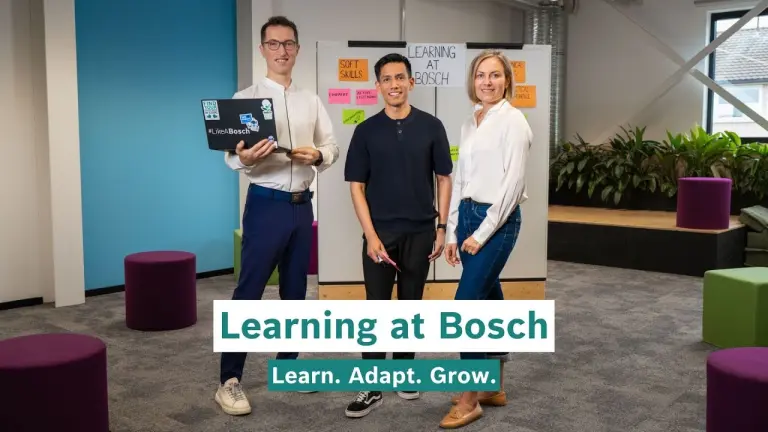
Loading the video requires your consent. If you agree by clicking on the Play icon, the video will load and data will be transmitted to Google as well as information will be accessed and stored by Google on your device. Google may be able to link these data or information with existing data.
How our associates experience the opportunities for further development at Bosch
Find out how Antonio, Karolina and Hamza make the most of the learning opportunities at Bosch and how they have developed themselves and others.
Profile Antonio
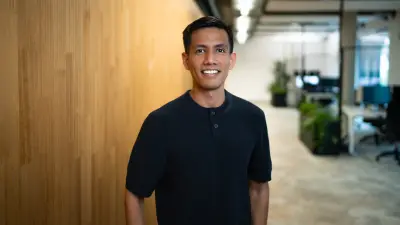
Antonio
Service Management Expert and Human Centered Design at Hire-to-Retire, Stuttgart, Germany
In 2015, Antonio joined Bosch in Mexico as a computer scientist engineer in the corporate IT department. A year later, he moved to the newly formed HR IT team at HR Services Mexico to gain even more insight into how the company works. He then went on to build and eventually lead the Service Management Team there. In 2019, he joined the Discovery Team Program in Germany, where he worked on start-up ideas. Following the program, he stayed in Stuttgart to support colleagues in the service management team.
Why is learning important to you personally?
I get bored quickly when I do the same thing for too long. That's why I like to take on new challenges — so that I can live up to my own standards at work. I am constantly developing myself further, both professionally and privately. For several years now, my goal has been to attend one or two training courses per year. Right now, for instance, I’m trying to make small leather goods like wallets, in my spare time. At the beginning of the year, I also completed a training course on human-centred strategy and recently achieved a certificate in change management.
When did you learn the most at Bosch?
Of course, there are times when I learn a lot and times when I don’t learn as much, but I keep at it. I think: At Bosch, there's a great attitude towards further education — which benefits me. In the second half of every year, I reflect on the areas in which I would like to develop further and start planning for the following year. Then I talk about it with my manager. I’m very lucky to have always had such great managers who have supported me in my ongoing learning. Hence having the chance to join the Discovery Team Program in Germany back in 2019.
On this program, we were tasked with developing a start-up concept. Five different colleagues from three different countries were thrown together to work as a team. Our first mission was to bond as a team — as none of us knew each other beforehand. During the program, we had coaches who supported us with topics such as human-centred design and user experience (UX). I learned a great deal during this time across multiple hard and soft skill areas.
What’s quite interesting about this program is that ultimately, we had to admit that our idea would not work at that point in time. Although it was difficult for us as a group, such decisions are very valuable in the business world. I have always appreciated Bosch’s ability to admit when something isn’t working — I really admire this approach.
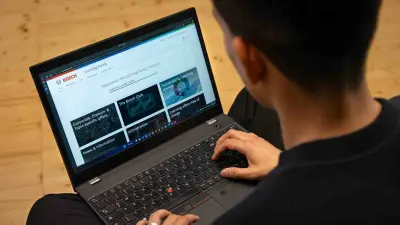
What advice would you give others?
When I moved from IT to HR, it was natural that I didn’t know everything straight away. I asked many questions to understand the processes better. Not everyone may feel confident doing that, but thanks to my colleagues — who were always open and supportive — I was able to learn quickly. I took the same approach when I moved from Mexico to Germany. While Bosch operates as the same company across both countries, the ways of working and culture are completely different. So my advice to anyone facing a similar change is: Although it’s not always easy to ask questions, it’s always worth it as it’s best way to improve in the long run.
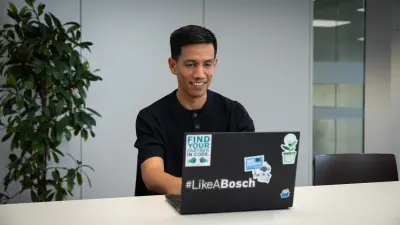
Profile Karolina
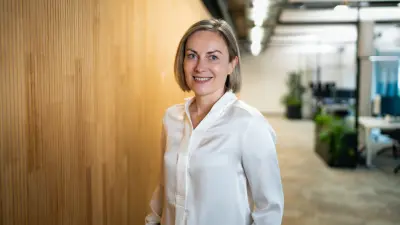
Karolina
People Development Partner and Business Coach at Bosch Sensortec, Kusterdingen, Germany
Karolina started as a marketing associate at Bosch in Germany in 2005. In 2016, she then shifted her professional focus towards organisational development. After a challenging period in her personal life, she completed an external further training and then moved to the HR department, where she still works today — initially at Bosch Power Solutions from 2022 and then at Bosch Sensortec from 2024. There, she helps her colleagues to develop their professional competences and soft skills.
How do you help others develop?
As a People Development Partner, my focus is on helping associates to develop their technical skills. For instance, if a colleague wants to advance his qualifications in a technical field, I check what training measures are needed to achieve this. This typically involves a mix of theoretical training and on-the-job mentoring by experts or networks who guide the associate through the process. That's why I work closely with expert networks and, in particular, with managers.
In addition, soft skills are particularly important to me. I am a certified business coach specialising in burnout prevention and career transition. Up to the end of 2024, I was a member of the Bosch Coaching Network for two years, providing one-to-one support to colleagues in these areas when needed. Since moving to my current position, I have shifted my focus to group-based work. I regularly run seminars and workshops. Open and unbiased communication about mental health is important to me, which is why I want to encourage open communication within the company through my seminars.
What can you expect from a mental health seminar?
Usually, managers approach me with a request. That's what happened recently: a manager told me that the group was working at full capacity. So I offered a seminar that included interactive elements. I like to start the seminar with a scale on the floor which represents energy levels, ranging from high to low. I name different times of the day and scenarios, and the participants stand at the point on the scale that represents their individual energy level. If the team's level is already low in the morning, this is a cause for concern. The advantage is that colleagues do not have to actively communicate their stress level, but can express their feelings through movement.
In general, I’m strongly committed to encouraging open and non-judgmental conversations about mental states. Colleagues often struggle in silence, so their mental health gets lost in everyday working life. I call this the 'happy face trap'. This can lead to destructive group dynamics, especially if several members of the team are affected. In the long term, this can lead to burnout and someone having to take time away from work. This is neither good for the individual nor the company. That's why I make sure that the teams and their managers have access to practical information, as prevention is key.
What does professional development at Bosch mean to you?
I enjoy learning from other people. That's why I get involved in various networks: I used to be part of the Innovation Network and now I’m active in Competence Management, the Coaching Platform and Women@Bosch. I know that the internal support and encouragement provided at Bosch cannot be taken for granted. I have always been able to rely on the support of my team, and I still can. It takes a lot of courage to question and redefine yourself, whether in terms of technical or soft skills. However, I’ve found that Bosch actively encourages this, and my colleagues recognise and appreciate that courage.
Profile Hamza
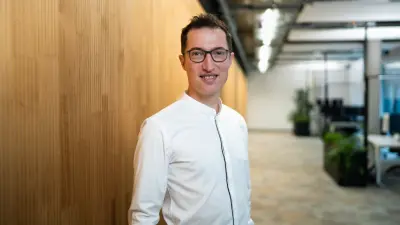
Hamza
Head of Sales and Marketing at Bosch copperdot, Ludwigsburg, Germany
Hamza began his career at Bosch in 2014 as an after-sales engineer in the Automotive Aftermarkets division in Istanbul, Türkiye. Until 2017, he was responsible for the technical and after-sales operations of automotive aftermarket test equipment. He then moved into digital transformation sales, taking on the role as a sales and project lead. In 2022, he relocated to Germany to join Bosch Business Innovations. Today, he continues to work in this unit as Head of Sales and Marketing at copperdot, a Bosch corporate start-up.
What does learning mean to you?
For me, learning is a never-ending process, and it's speeding up right now thanks to all the AI tools. I have always been interested in software, IT and technology, which is why I taught myself how to code. Today, it only takes me a few days to write a code in Python — something that would have been impossible in the past. Digital tools make me feel very comfortable because I can easily access very specific information. However, this doesn't mean that people don't have to keep learning. Professionally, for example, I am currently trying to further my education in the field of international sales. Understanding business in different cultures and on different continents can be difficult. As a leader, I’m continually developing my leadership skills. For me, learning isn’t only about gaining technical expertise, it’s also about personal growth.
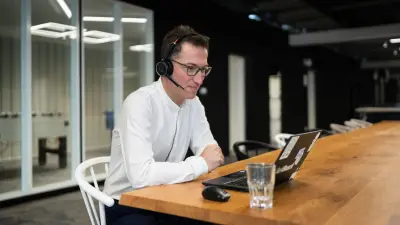
What challenges have you encountered in the course of training and how did you solve them?
During my time in Türkiye, we were assigned a project to integrate the Bosch Nexeed solution into a factory. With Nexeed Automation, we simplify machine engineering for our partners and ensure efficiency in real manufacturing operations. Once, we couldn’t handle this with the standard tools, so we searched for another option. We found a tool, but no one on our project team could use it because of its specialised coding language. So I reached out to an expert in Poland, who guided me through it. Thanks to him and the knowledge and support within Bosch, I was able to learn the language — and in the end, I was the one who delivered the project with the custom code. That remains a proud achievement for me.

This example illustrates how professional development can happen naturally through projects and daily tasks. However, conflicts can also arise between day-to-day business and further training measures. Sometimes you ask yourself: What is more important? How should one prioritise? I have developed a personal test that helps me with these decisions. I ask myself: Which option makes more sense for Bosch? Of course, this doesn't always work, but most of the time this helps me identify which issues can wait and which are a priority. I try to instil this mindset amongst my team so that they learn how to strike the right balance.
How do you help others to develop?
As a leader, I help my team understand their own needs and guide them through finding the right training or methods for their development. In both cases, I try not to do too much. I believe that creating self-awareness is one of the most important things. I coach them by asking questions such as: Where do you see yourself? What areas do you need to improve in, and what would you like to focus on more? What makes them happy? This helps me understand their motivation — and then I can help them develop further.
